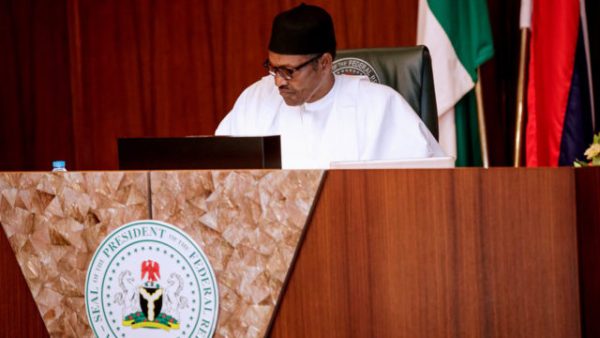
• Why FG might be unable to pay, by financial experts
The Nigeria Labour Congress (NLC) reacted cautiously yesterday to news that President Muhammadu Buhari has assented to the proposed N30,000 National Minimum Wage Bill.The movement needs concrete proof that the president has indeed signed the law, said NLC General Secretary Dr Peter Ozo-Eson.
“Considering the inconsistencies in the polity, we are treading cautiously and hoping that is true. We will react officially when we see concrete evidence later in the day or tomorrow. But for now, the NLC does not have an official position,” he said. Also, some financial experts expressed concern that unless the Federal Government creates an alternative source to fund the wage, the anticipated impact might not be felt in the economy. They said that considering the nation’s huge debt profile, the Federal Government might be constrained in terms of funding the new wage and may eventually opt for the removal of fuel subsidy.
Economist Johnson Chukwu affirmed that the minimum wage would stimulate consumer spending and boost the overall economy by generating increased consumer demand. He said both federal and state governments would struggle in terms of funding, which might ultimately lead to excess borrowing.

According to him, “Should the government fail to come out with an alternative funding source, it would be difficult to fund the new minimum wage and this would lead to more industrial action from the labour unions. Government must have a way, the shortest route to address the funding. “The NYSC allowance is a cash obligation to the Federal Government in addition to other Federal Government workers’ salary. Its impact on the Federal Government’s bill will be higher than imagined.
“The figure on the petroleum subsidy should be enough to fund this minimum wage should the government take it off. It would be a good source to fund the wage, if not, the government will keep borrowing to do so.”The managing director of Highcap Securities, David Adonri, said government might be compelled to take more debts to service such recurrent expenditure, if it fails to expand its tax revenue.
“Government has already over-borrowed, but if the nation’s tax pay is not expanded, government might be forced to take more debt to service such recurrent expenditure.“Again, it should not be imposed on the states because they cannot finance it. Government officials are stealing over 80 per cent of what is budgeted for the states. If they decide to be more honest, the resources available might finance the minimum wage.”
A financial expert, Prof. Uche Uwaleke, expressed optimism that the Federal Government can service the cash obligation by tinkering with the tax system. He said: “The challenge will come from the state government. The Federal Government should be able to pay because they have factored it into the 2019 budget. Before the end of the year, the Federal Government might be compelled to increase the Value Added Tax (VAT).
“I also foresee the oil subsidy might go to be able to fund it. The government will have more money in their generating account while the state can pay with the subsidy removal. These are the hard nuts the country might have to chew in order for government to fund the minimum wage.”The executive secretary of the Organisation of Trade Unions of West Africa (OTUWA), John Odah, however described the president’s assent as a positive development.“This is a law that Nigerian workers have been expecting for more than three years now. I think the workers would be happier,” he said.
According to him, “The next stage of the struggle for labour now is to ensure that the state governments implement this law. They cannot choose not to implement this law.”
Briefing State House correspondents after he met Buhari at the Presidential villa, Abuja, Senior Special Assistant on National Assembly Matters, Senator Ita Enang, said: “You can see me smiling on behalf of Nigerian workers. President Muhammadu Buhari has assented to the minimum wage repealing the old one and Enactment Act 2019. This makes it compulsory for all employers of labour in Nigeria to pay to their workers the sum of N30,000. This excludes persons who are employing less than 25 workers, persons who work in a ship, which sails out of jurisdiction and other persons who are in other kinds of regulated employment, which are accepted by the Act.”
He explained: “It also gives the workers the right, if you are compelled by any circumstance to accept salary that is less than N30,000, to sue your employer to recover the balance and authorises the minister of labour and any person nominated by the minister of labour, or any person designated by the minister of labour in any ministry, department or agency to, on your behalf, take action in your name against such employer to recover the balance of your wages.”
On when the Act comes into effect, Enang said: “The effective date is April 18, 2019, as Mr. President has assented to. It has been assented to today and it takes effect today, except such other provisions as are contained in the Act. But the enforcement and the right to start the implementation of the provisions commences today (Thursday), including such steps that are to be taken gradually under the provisions of the Act.”
The president, while giving his assent, was quoted as saying: “I will like, with the cooperation of the Nigeria Labour Congress (NLC), to look at the economic situation of the country, the population, the poor infrastructure that we are trying to fix in terms of roads, rail and power. So, I wish Nigerian workers the best of luck.”
The Guadian
 MMS PLUS NG – Maritime, Aviation, Business, Oil and Gas News Online Newspaper with coverage in Maritime, Oil and Gas, Aviation, Power and Energy as well as Financial News
MMS PLUS NG – Maritime, Aviation, Business, Oil and Gas News Online Newspaper with coverage in Maritime, Oil and Gas, Aviation, Power and Energy as well as Financial News









